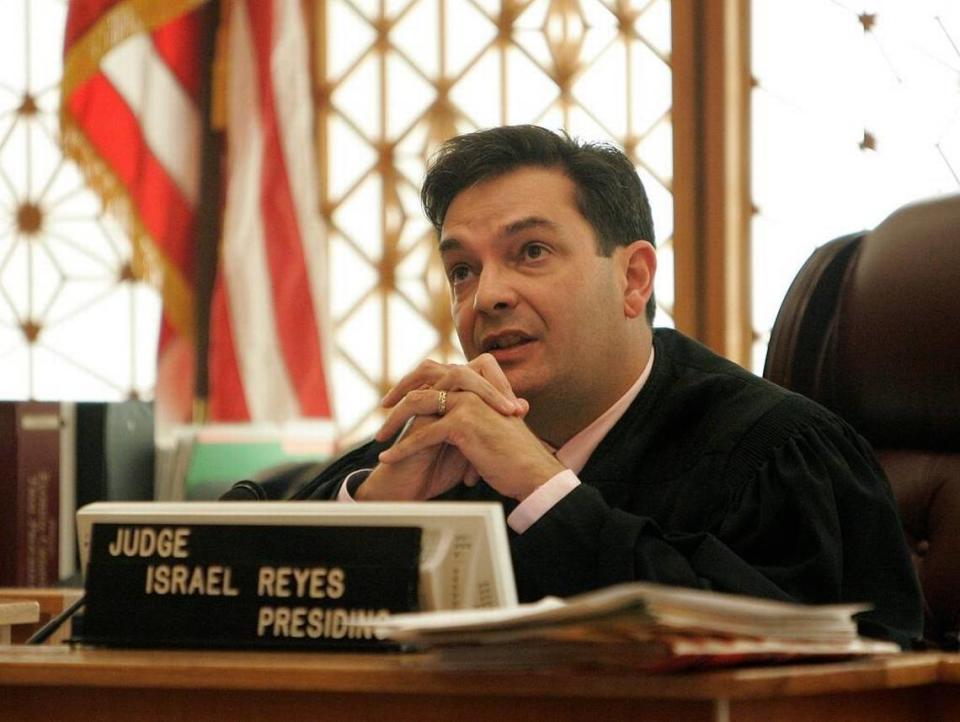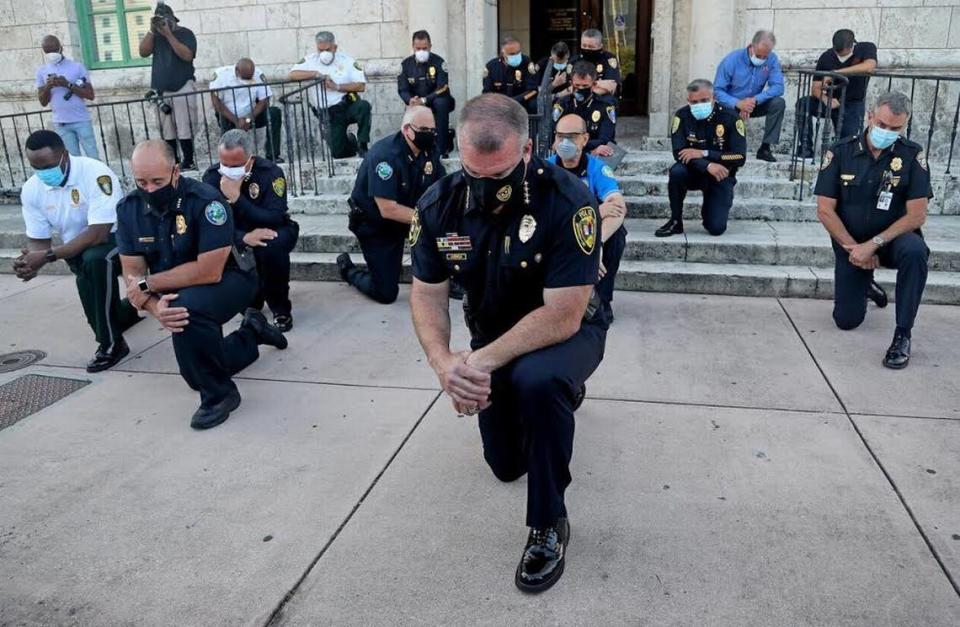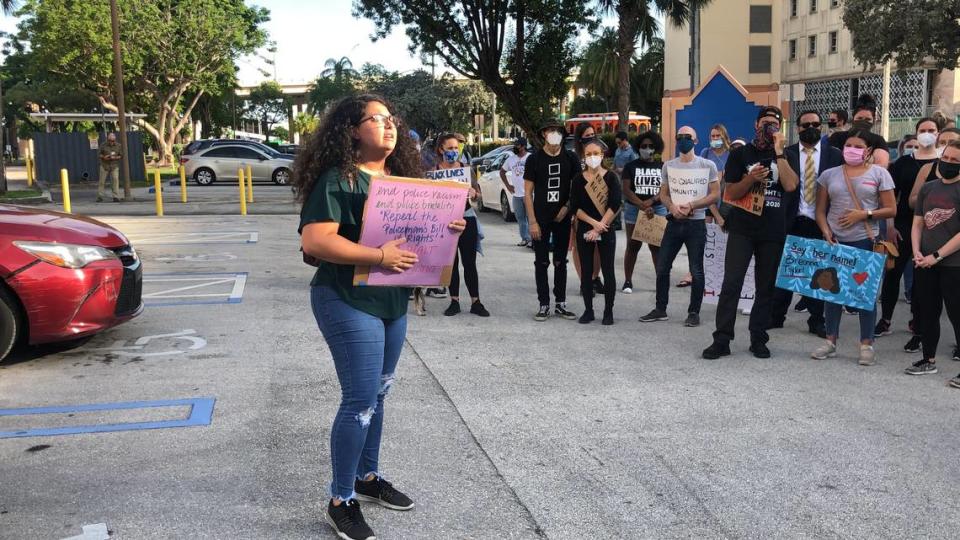Gables pays an ex-judge to help prosecutors with cases. Some question the approach
In Coral Gables, the well-heeled city that’s home to pricey restaurants, Spanish-tiled mansions and the University of Miami, officials tout an initiative called the Justice Advocate Program.
It’s run by a well-known former Miami-Dade judge, whose firm charges the city $250 an hour to help prosecutors and advocate for the “maximum effect of the criminal justice system” for “habitual criminals who victimize Coral Gables residents.”
But six years into the program — as calls for justice reform have resonated across the country — critics question whether it accomplishes anything beyond pressuring prosecutors to call for harsh sentences while unfairly targeting minorities who get arrested in one of South Florida’s richest cities.
And not everyone tracked by the program is a “habitual” hardened criminal. Among them: a group of teens who broke into the house of ex-NBA star Ray Allen, two teens accused of shoplifting at the swank Merrick Park mall, two girls — ages 12 and 13 — accused of breaking into cars and a mentally ill homeless man who set fire to a dumpster, according to court records.
“As a longtime Coral Gables resident, this seems like a waste of resources,” said Aubrey Webb, a former Miami-Dade assistant state attorney and current defense lawyer. “The prosecutors are plenty capable of handling these cases. They don’t need a city attorney whispering in their ear, trying to get max punishment.”
City officials and Israel Reyes, the former judge who works with Coral Gables, defend the program as valuable.
“Having an extra set of eyes on a case as it travels through [the court system] is a benefit to the residents of Coral Gables,” said city attorney Miriam Ramos, noting that prosecutors have large caseloads. “My sense, generally, is they appreciate the help.”
Reyes told the Miami Herald that, despite the program’s stated goal to seek punishment, he doesn’t always do so, particularly in cases involving mental health concerns. “The program is not to make sure that the people are punished to the fullest extent of the law. It’s to make sure there’s justice,” Reyes said. “It doesn’t always mean that the way to prevent crime is to throw the book at someone.”

The Miami-Dade State Attorney’s Office would not say whether it finds the Justice Advocate Program effective, or if city-hired lawyers actually offer substantive help.
“The SAO works cooperatively with every municipality that has a plan/approach to decrease criminal activity within their jurisdictions,” said Ed Griffith, a spokesman. “The Coral Gables approach is unique.”
Hard-line approach
Coral Gables has long taken a hard-line approach to property crimes in the name of keeping residents safe. Last week, after police said they caught five teenagers on camera spraying graffiti on storefronts and walls from Miracle Mile to the Coral Gables Youth Center, Mayor Raúl Valdés-Fauli called it a “heinous destruction of property.”
“We will prosecute to the full extent of the law,” he said.
Prosecuting crimes, of course, isn’t the mayor’s job. Instead, city officials hope the Justice Advocate Program will help.
The program has received little attention outside of Coral Gables — some prosecutors involved in the cases told the Herald they weren’t even aware of its existence.
Created in 2014 under then-Mayor Jim Cason and city attorney Craig Leen, the Justice Advocate Program was expanded two years later to include all felonies (except drug-related crimes) and misdemeanors such as trespassing. Program documents say Reyes could also work on any case in which a city employee is the victim, or in which “members of the media have responded or are likely to be involved.”
In 2017, the city expanded the program again, giving officials authority to review State Attorney memos that explain why criminal cases were dropped. The goal: to see if the city could impose its own civil citations for violations of city code.
“The idea behind the expansion of the program is to ensure that every crime committed in the city is addressed,” Ramos wrote in an internal memo at the time, “and that, to the degree possible, every perpetrator faces a consequence for his/her criminal act.”
Coral Gables stopped that after the city said it was “deemed not to be effective,” according to a memo.
Reyes, 61, is an influential figure in Coral Gables and South Florida legal circles. A former Miami-Dade police officer turned prosecutor, Reyes served eight years as a circuit judge before moving to private practice in 2011. His office is located in Coral Gables less than half a mile from city hall.
The city has paid over $192,000 to The Reyes Law Firm P.A. for work related to the program, including $38,000 in 2019. Recent invoices show the firm charges the city $250 an hour — a rate that Reyes said is “deeply discounted” from what he typically charges clients. “It’s nowhere near that,” he said.
Coral Gables Police Chief Ed Hudak said he absolutely believes “we’re getting a bang for our buck.”
“He represents us and the victims to make sure nothing falls through the proverbial cracks,” Hudak said. “He makes sure the city and the victim’s wishes are expressed.”
How does the program work?
The police department refers cases to Reyes, or his law partner and son Christopher, who then reach out to Miami-Dade prosecutors to offer their assistance on cases: doing legal research, facilitating contact with victims, or attending bond hearings to present the city’s position — and to tell them when the city has a particular interest in seeing a conviction.
In one case, officials boasted in a presentation to the city commission, they helped convince a judge to increase a defendant’s bond amount from $8,500 to $50,000 after charges of burglary and indecent exposure. The logic of that approach, city officials say, is that higher bond amounts increase the likelihood of convictions and guilty pleas — although bail is supposed to ensure defendants appear in court, not serve as punishment.
Reyes says his role also involves advocating for court-issued stay-away orders when residents are victimized, and maintaining contact with the victims to encourage them to cooperate with prosecutors.
But in many cases, Reyes’ precise role is unclear. Spreadsheets and presentations from his firm often indicate a justice advocate made initial contact with prosecutors but say little else about their involvement. Invoices from the firm suggest much of the work involves reviewing and sending emails. Each time Reyes or his son reviews an email related to the program, they charge the city $25.
In one spreadsheet, the email addresses for prosecutors on more than a dozen 2018 cases were incorrect, using the “first initial, last name” format instead of the “first name, last name” format used by the State Attorney’s Office. Test emails sent to some of those addresses by Herald reporters bounced back.
Sarah Waters, a former Miami-Dade prosecutor who handled one burglary case listed as part of the Justice Advocate Program, remembers receiving a few emails from the Gables-contracted lawyers but said they played little role in how the case unfolded.
Instead, she said, the strength of the evidence collected by Gables police and existing sentencing laws led to two burglars getting sent to prison for more than a year. A third got probation.
“The overall result of a program is not necessarily less crime, but certainly Coral Gables benefits by publicizing a ‘tough on crime’ reputation and encouraging criminals to stay outside the city limits,” she said.
Waters, who now runs her own law firm, added that Miami-Dade prosecutors are entrusted with seeking fair justice for victims from all parts of the county, not just Coral Gables. Still, Gables officials and residents have a right to be heard on issues of crime, she said.
“Prosecutors are overworked, and the office is grossly understaffed, so a program like this may force them to pay more attention to some of these cases,” Waters said.
In six years, the Justice Advocate Program has tracked the cases of at least 183 defendants arrested in Coral Gables for a range of offenses, records show. About 28% of those defendants were Black, a Herald analysis found, compared with 3.4% of the city’s population and about 23% of all defendants arrested in the city, according to a 2018 study by the ACLU.

ACLU has concerns
About 14% of the defendants tracked have been white non-Hispanic, compared with 24% of all defendants in Coral Gables and 34% of residents. Another 46% of defendants tracked were white Hispanic, slightly less than the 48% that group comprises among Coral Gables defendants and the 56% it comprises among city residents.
(The Herald used a U.S. Census list of Hispanic surnames to determine, as accurately as possible, whether a defendant was Hispanic. Miami-Dade circuit court records don’t list that information.)
Nicole Sinder, the president of the board of directors for the ACLU of Florida’s Greater Miami chapter, said the ACLU wasn’t aware of the Justice Advocate Program but said its stated goals were concerning.
“Programs like these perpetuate the ‘tough-on-crime’ mentality that dominated the United States for a period of time,” Sinder said. “What we ended up with was overcrowded prisons and jails, communities ravaged by over-policing, zero-tolerance and ‘broken windows’ policies that destroyed lives, with the undercurrent of stark racial disparities at all stages of the system.”

Ramos, the city attorney, said referrals to the program are based on various factors, including “the crime committed, the severity of the crime, whether the subject is a habitual offender, whether an employee of the city is a victim, and whether the case is likely to acquire a high-profile nature.”
“Neither the offender’s race nor his/her ethnicity is a factor in whether a case is referred to the program,” Ramos said in an email.
Still, while the city commission presentations have said the Justice Advocate Program was aimed at repeat offenders, those guidelines weren’t always followed from the start, records show.
In one high-profile case, the program highlighted seven teens who broke into the Coral Gables house of former Miami Heat star Ray Allen in 2014. The teens were charged with misdemeanor trespassing — not felony burglary — after prosecutors said they could not prove forced entry, criminal intent or that anything was stolen.
“It is unacceptable to the city of Coral Gables that an individual can walk into someone’s home in the middle of the night and not face immediate arrest,” Reyes told the Herald at the time, advocating for lawmakers making trespassing into an occupied house a felony.
Other cases on the list: Two girls, ages 12 and 13, who were part of a group of young people arrested on allegations they were breaking into cars in November 2018, and two 14-year-old boys who were alleged to have shoplifted at a Neiman Marcus department store at Merrick Park.
In another example, the program listed the case of nutritionist Simon Sullenberger, who was cleaning his shotgun in his yard when confronted by two Gables officers. Prosecutors wound up dropping two attempted murder charges against Sullenberger after video showed he never pointed the weapon at officers, as they initially claimed.
Defense lawyer Roberto Pertierra, who learned about the Justice Advocate Program from a reporter, bristled at how Sullenberger’s case was described in a city commission presentation — that “officers’ brave actions prevented a volatile situation with a firearm from escalating.”
“I’m offended — these cops lied under oath in the filing of their reports,” Pertierra said. “This situation was volatile because they made it volatile.”
Making the Gables safer?
The Gables insists that the city isn’t technically a party to the criminal cases, and that prosecutors are ultimately in charge.
Still, Ramos touts safer streets. She told the Herald that the types of crimes the Justice Advocate Program initially sought to address — including home and car break-ins — decreased after the program began. “The fact that the concerns in place in 2014 went away speak to the success” of the program, she said.
But crime data from the FBI shows that the rate of property crimes reported in Coral Gables had already been declining steadily, starting in 2012, two years before the program began. Miami-Dade police have similarly seen a decrease in property crimes reported over the past decade — mirroring state and national data.
Webb, the former prosecutor, called the idea that crime is down because of the program “dubious.”
Said Webb: “The idea that would-be criminals are shaking in their boots, avoiding breaking the law in Coral Gables because of the Justice Advocate Program, is laughable.”

